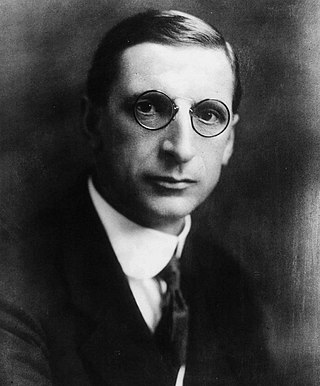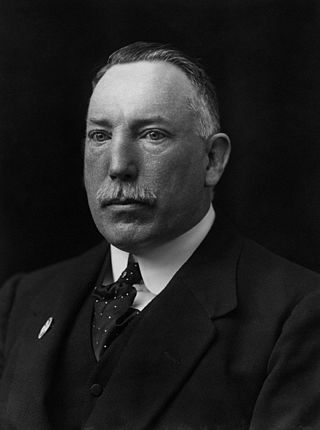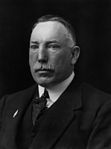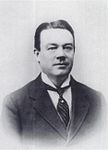
The Parliament of Northern Ireland was the home rule legislature of Northern Ireland, created under the Government of Ireland Act 1920, which sat from 7 June 1921 to 30 March 1972, when it was suspended because of its inability to restore order during the Troubles, resulting in the introduction of direct rule. It was abolished under the Northern Ireland Constitution Act 1973.

The Irish component of the 1918 United Kingdom general election took place on 14 December 1918. It was the final United Kingdom general election to be held throughout Ireland, as the next election would happen following Irish independence. It is a key moment in modern Irish history, seeing the overwhelming defeat of the moderate nationalist Irish Parliamentary Party (IPP), which had dominated the Irish political landscape since the 1880s, and a landslide victory for the radical Sinn Féin party. Sinn Féin had never previously stood in a general election, but had won six seats in by-elections in 1917–1918. The party had vowed in its manifesto to establish an independent Irish Republic. In Ulster, however, the Unionist Party was the most successful party.
Armagh or County Armagh is a former county constituency in the House of Commons of the United Kingdom. It was a two-member constituency in Ireland from 1801 to 1885 and a single-member constituency in Northern Ireland from 1922 to 1950. It was replaced in boundary changes in 1983.

The 1921 Irish elections took place in Ireland on 24 May 1921 to elect members of the House of Commons of Northern Ireland and the House of Commons of Southern Ireland. These legislatures had been established by the Government of Ireland Act 1920, which granted Home Rule to a partitioned Ireland within the United Kingdom.
There were two elections in Ireland on 24 May 1921, following the establishment of the House of Commons of Northern Ireland and the House of Commons of Southern Ireland under the Government of Ireland Act 1920. New constituencies were established for both parliaments. A resolution of Dáil Éireann on 10 May 1921 held that these elections were to be regarded as elections to Dáil Éireann and that all those returned at these elections be regarded as members of Dáil Éireann. According to this theory of Irish republicanism, these elections provided the membership of the Second Dáil. The Second Dáil lasted 297 days.

The 1949 Northern Ireland general election was held on 19 February 1949. The election became known as the Chapel-gate election because collections were held at churches in the Republic of Ireland to support the Nationalist Party campaign.

The 1938 Northern Ireland general election was held on 9 February 1938. Like all previous elections to the Parliament of Northern Ireland, it produced a large majority for the Ulster Unionist Party, who won three-quarters of the seats.

The 1929 Northern Ireland general election was held on 22 May 1929. Like all previous elections to the Parliament of Northern Ireland, it produced a large majority for the Ulster Unionist Party. It was the first held after the abolition of proportional representation and the redrawing of electoral boundaries to create single-seat constituencies. As with the rest of the United Kingdom, this has made it more difficult for independent and minor party candidates to win seats.
Down is one of the six counties comprising Northern Ireland.
The Northern Ireland Conservatives is a section of the United Kingdom's Conservative Party that operates in Northern Ireland. The Conservatives are the only major British party to field candidates within Northern Ireland and typically contests only a fraction of seats in elections. The party won 0.03% of the vote in the 2022 Northern Ireland Assembly election and 0.1% of the vote in the 2024 United Kingdom General election in Northern Ireland.

Mid Armagh was a constituency of the Parliament of Northern Ireland.
East Down was a constituency of the Parliament of Northern Ireland.
Mid Down was a constituency of the Parliament of Northern Ireland.
West Down was a constituency of the Parliament of Northern Ireland.
North Down was a constituency of the Parliament of Northern Ireland.
Iveagh was a constituency of the Parliament of Northern Ireland.

The 2011 Northern Ireland Assembly election took place on Thursday, 5 May, following the dissolution of the Northern Ireland Assembly at midnight on 24 March 2011. It was the fourth election to take place since the devolved assembly was established in 1998.

The 1923 United Kingdom general election in Northern Ireland was held on 6 December as part of the wider general election. There were ten constituencies, seven single-seat constituencies with elected by FPTP and three two-seat constituencies with MPs elected by bloc voting. Only three of the constituencies had contested elections.

The 1950 United Kingdom general election in Northern Ireland was held on 23 February as part of the wider general election. The Representation of the People Act 1948 reorganised constituencies: all MPs were now elected single-seat constituencies using FPTP, ending the two-seat constituencies which had been in place till then, and the university constituency of Queen's University of Belfast was abolished.













